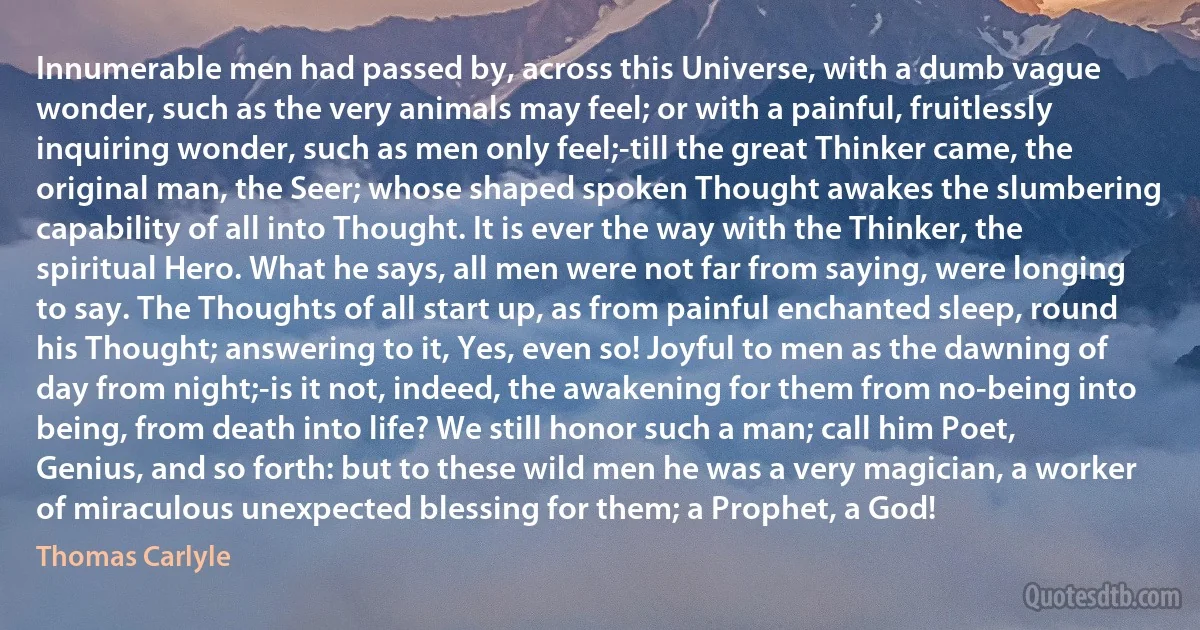
Innumerable men had passed by, across this Universe, with a dumb vague wonder, such as the very animals may feel; or with a painful, fruitlessly inquiring wonder, such as men only feel;-till the great Thinker came, the original man, the Seer; whose shaped spoken Thought awakes the slumbering capability of all into Thought. It is ever the way with the Thinker, the spiritual Hero. What he says, all men were not far from saying, were longing to say. The Thoughts of all start up, as from painful enchanted sleep, round his Thought; answering to it, Yes, even so! Joyful to men as the dawning of day from night;-is it not, indeed, the awakening for them from no-being into being, from death into life? We still honor such a man; call him Poet, Genius, and so forth: but to these wild men he was a very magician, a worker of miraculous unexpected blessing for them; a Prophet, a God!
Thomas CarlyleRelated topics
across blessing call came day death far forth genius great hero honor inquiring men life magician man night prophet round say saying seer sleep speak start thought thinker till vague way wild wonder yesRelated quotes
And as for the close connection between philosophy and poetry, we can refer to a little-known statement by Thomas Aquinas in his Commentary on Aristotle's Metaphysics [I, 3]: the Philosopher is akin to the Poet in this, that both are concerned with the mirandum, the "wondrous," the astonishing, or whatever calls for astonishment or wonder. This statement is not that easy to fathom, since Thomas, like Aristotle, was a very sober thinker, completely opposed to any Romantic confusion of properly distinct realms. But on the basis of their common orientation towards the "wonderful" (the mirandum - something not to be found in the world of work!) - on this basis, then, of this common transcending-power, the philosophical act is related to the "wonderful," is in fact more closely related to it than to the exact, special sciences; to this point we shall return.

Josef Pieper
Shakespeare, no mere child of nature; no automaton of genius; no passive vehicle of inspiration possessed by the spirit, not possessing it; first studied patiently, meditated deeply, understood minutely, till knowledge became habitual and intuitive, wedded itself to his habitual feelings, and at length gave birth to that stupendous power by which he stands alone, with no equal or second in his own class; to that power which seated him on one of the two glorysmitten summits of the poetic mountain, with Milton аs his compeer, not rival. While the former darts himself forth, and passes into all the forms of human character and passion, the one Proteus of the fire and the flood; the other attracts all forms and things to himself, into the unity of his own Ideal. All things and modes of action shape themselves anew in the being of Milton; while Shakspeare becomes all things, yet for ever remaining himself.

Samuel Taylor Coleridge
[wrote_the_exam]What keeps me awake at night: wondering whether human species is just too stupid to figure out the Universe. I just wonder. I lose sleep over that. Because we define ourselves as intelligent- because we made up the test to say that. And we sit alone at the top of the intelligence chart because we invented the exam, and all the other species of life on Earth are not. So who's to say that the first species (us) to be intelligent (us) has just enough intelligence to actually decode everything that's decodable in the Cosmos? [...] Think of the next closest thing to us, the bonobo chimp- 98½% identical DNA, yet you cannot teach them trigonometry, they have no concept of it. So if that's only 1½% difference in our DNA- and so imagine 1½% beyond us, rather than below us, in intelligence. [...] Their toddlers would be talking about things that would completely confound us.

Neil deGrasse Tyson
My feet they are sore, and my limbs they are weary;
Long is the way, and the mountains are wild;
Soon will the twilight close moonless and dreary
Over the path of the poor orphan child.Why did they send me so far and so lonely,
Up where the moors spread and grey rocks are piled?
Men are hard-hearted, and kind angels only
Watch o'er the steps of a poor orphan child.Yet distant and soft the night breeze is blowing,
Clouds there are none, and clear stars beam mild,
God, in His mercy, protection is showing,
Comfort and hope to the poor orphan child.Ev'n should I fall o'er the broken bridge passing,
Or stray in the marshes, by false lights beguiled,
Still will my Father, with promise and blessing,
Take to His bosom the poor orphan child.There is a thought that for strength should avail me,
Though both of shelter and kindred despoiled;
Heaven is a home, and a rest will not fail me;
God is a friend to the poor orphan child.

Charlotte Brontë
Harry Dresden: There's power in the night. There's terror in the darkness. Despite all our accumulated history, learning, and experience, we remember. We remember times when we were too small to reach the light switch on the wall, and when the darkness itself was enough to make us cry out in fear. Get a good ways out from civilization-say, miles and miles away on a lightless lake-and the darkness is there, waiting. Twilight means more than just time to call the children in from playing outside. Fading light means more than just the end of another day. Night is when terrible things emerge from their sleep and seek soft flesh and hot blood. Night is when unseen beings with no regard for what our people have built and no place in what we have deemed the natural order look in at our world from outside, and think dark and alien thoughts. And sometimes, just sometimes, they do things.

Jim Butcher
